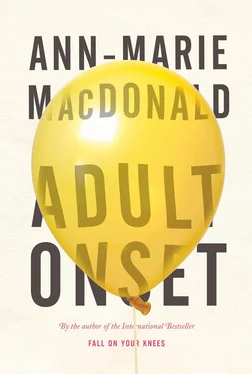She is lying on the couch facing the coffee table.
A baby is crying.
The sun has moved.
It is quiet now.
Someone is knocking at the door.
What day is it?
Someone is knocking at the door. Is it today or yesterday?
A woman’s voice: “Hi there, Dolly, it’s Eileen, I’m here with Mona …”
She closes her eyes.
Mona’s voice: “Dolly, if you’re home, dear, open up, we’ve come with a stew.”
She turns to face the back of the couch.
Eileen: “Think of Duncan, dear.”
At the door, she tells them she was lying down with the baby. They look in on it. “She’s beautiful, Dolly, she looks like you,” says Mona.
“Reheat it in the oven at three hundred and fifty degrees,” says Eileen. “And put on some lipstick.”
•
Duncan knew his wife was rundown for a while after the baby was born, but she bounced back. Some men came home to women who looked as though they’d spent the day with their head in a dirty oven, but those women weren’t air force wives. Even so, most women couldn’t hold a candle to Dolly.
“You look right jazzy, Missus, what’s for supper?”
“I made a stew.”
“My favourite.”
•
Babies die, it happens. Crib death. If you think a thing, it might happen … Think nice thoughts. But dread invades the living room, finds her on the couch, presses on her, gets inside her where it swiftly grows bigger than she is until she is inside it, looking out from a rind of shadow. Anything could happen to her baby. It could drown in the tub, it could fall from the balcony. It could be taken from the stroller while her back is turned. The hired German woman could come back and steal her. As long as her baby is here, she can be taken away. It is almost as if, as long as the baby is alive, the baby is not safe.
Is this sleep? It is not wakefulness. There is the coffee table, there is the glass door, there is the balcony. There is all this, so there must be someone seeing it. There must be an “I.”
A baby is crying.
After a while, it stops.
The baby does not cry as much now. Some days, not at all. She gets up and goes in. It is not moving, but it is awake. It is a dark little thing. It stares up at her and she understands the problem. “My baby doesn’t like me.”
“Are you feeling better today, Mummy?”
Her older girl has turned out to be a good little helper. Home from school every day at three-thirty. “Maureen, watch the baby while I put supper on.”
At five o’clock: “Maureen, set the table while I get dressed.”
And when he comes in the door: “Don’t you look snazzy, Missus, what’s the occasion?”
One day it is as though a clock has restarted inside her. She is back. Time is the best medicine.
“Golly Moses, Mary Roses!”
The baby chuckles and the sound reminds her of a packet of Chiclets.
“Cuc-koo!” she says, popping out from behind her hands like the painted cuckoo from the clock. “Cuc-koo!” The baby mirrors her big smile.
She cannot for the life of her understand what was bothering her all winter when she could hardly get up off the couch. “What was the matter with me anyhow, Dunc?”
“Not a thing, you had a baby, you were tired.”
“I was right blue, when I think about it.”
“Don’t think about it.”
The baby pulls herself up by the coffee table. “Dunc, come look at your daughter, dear, she’s standing!”
“Atta girl, Mister!”
•
Children were not permitted to play in the Black Forest by themselves, but there were other attractions to make up for the nice new playground’s lack of allure. A concrete bunker was left over from the war; slits for gun barrels and pockmarks from bullets attested to its authenticity. If you had been standing in that spot twenty years ago, you would have been shot. An iron plate was welded into the ground, and Maureen told her it led to an underground bomb shelter with food and a nice table set for supper, and a playroom for the children. Then she added that Hitler had died down there. Starved and turned into a skeleton. “He’s still down there, sitting at the table with a cup of tea.” Mary Rose took it in. Hitler was a word. It had “hit” in it. Everyone knows you must not hit. One day an older boy showed up in his father’s old gas mask. Blank glass eyes, obscene wrinkly snout, no ears — her first memory of fear.
•
The following spring, she gets the best news of all. She is pregnant again. She is going to have another baby, maybe even a boy. She has no right to be anything but happy.
•
The next baby lived long enough to be baptized, so his name really did belong to him. Alexander. Mary Rose saw the grave when they visited it one day in spring; remembers looking down at it, with her hands folded. She was wearing white — it matched the stone tablet, flush against the grass. Her mother’s sweater was draped comfortingly over her shoulder — she recalls the gentle pressure of her mother’s hand, holding it in place. Mary Rose broke the silence: “Why is he down there?” Her father replied just as gently, “Shhh.” And she realized her question had been shamefully rude. She also realized she was supposed to know the answer already. But again, perhaps she merely remembers the photograph; a black-and-white snapshot in the old album that she used to pore over secretly. At the time her father took it she could not have been more than two — three? — even so, she knew the difference between a bunker and a grave. Hitter was in one. Her brother was in the other. At the edge of a forest full of Christmas trees.
With the passage of years, he became Alexander-Who-Died. His myth remained static, like his reddish hair and yellow receiving blanket — details her father never fails to include. Yellow, perhaps, for the jaundice that killed him. “There was nothing wrong with him that couldn’t be fixed nowadays …” In Mary Rose’s mind he is suspended, wrapped in his yellow blanket, like a setting sun. There is no date, no season, nor any sense that the image might belong to a sequence. A single station of the cross. Like myth, it is outside time, where it endures, as mute as the graveside photo to which she returned over and over as though hoping each time to see something new. Until one day she opened the album and it was gone.
•
The priest performs the baptism just in time, and the nurse asks the young air force officer if he would like to hold the baby. He nods and she places his son, wrapped in a yellow receiving blanket, in his arms. The corridor is strung with tinsel. At the nurses’ station a small tree stands on the counter.
They have named him Alexander.
•
Mary Rose was shy of her fourth birthday when they were posted back to Canada, across an ocean of time. They left him behind. Just as they left behind the sky, the treetops, the balcony and the big hot sun going down. Time was severed, and began again. “We’re home, kids.” Snow. English. Bold seasons, big roads. Different smell. School. “Pay attention!” Trenton air force base, with not a honey wagon in sight, and the air full of the clumsy rumble of Hercules supply planes. Always in view was the vastness of what in most countries would be called a sea but in Canada was known simply as “one of the Great Lakes.” Ringed with industry, home to “the Thousand Islands” and divided lengthwise by the US border, Lake Ontario was a burial vault for shipwrecks and waste, or an azure immensity, depending on the season and where you stood. They lived on a base again but graceful lindens and glistening apartment buildings had given way to three styles of serviceable houses, immaculate with not a garden to be seen — gardens were long-term propositions. “One of these days, I’ll plant a tree,” mused her father. Her brother was born there — her brother-who-lived — and then they were posted again, three hours west down the 401 to Hamilton. See Jane run! Different city, same lake. New school. See Jane fall!
Читать дальше












